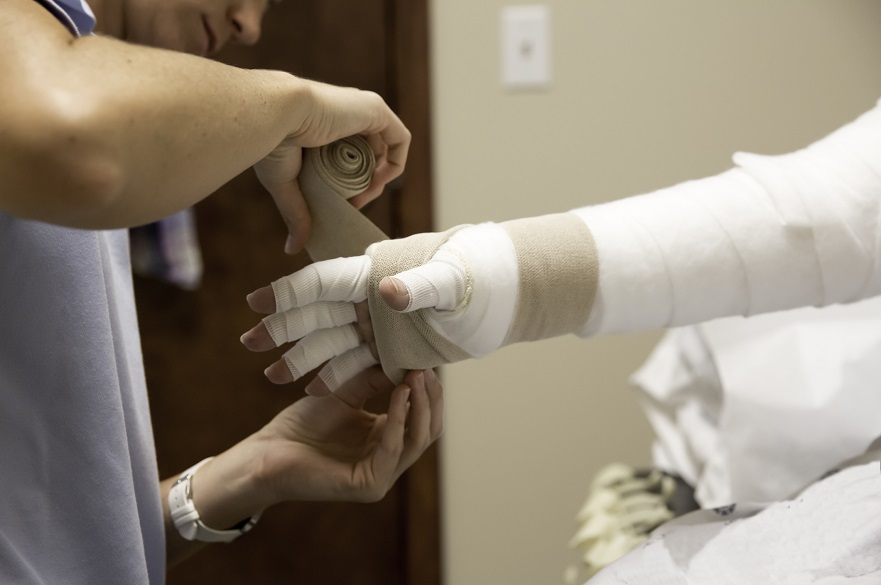Breakthrough smart textile sleeve will improve treatment and quality of life for lymphoedema patients
A ‘breakthrough’ smart textile arm sleeve will use electrical stimulation to reduce swelling and discomfort for patients with lymphoedema.
By Dave Rogers | Published on 25 March 2022
Categories: Press office; Research; School of Science and Technology;

Engineers at Nottingham Trent University are leading the project to create the garment, which will be an ‘effective, unobtrusive and easy-to-use’ treatment for patients in their own home.
Lymphoedema is a chronic condition caused by fluid collecting in the soft tissue of the body, usually in the arms or legs, and there is no cure or proven pharmaceutical treatment.
It is estimated that up to 250 million people worldwide are currently suffering from different types of lymphoedema, which if left untreated can cause patients long-term physical and psychological problems.
As well as affecting the quality of life of patients, this can also impact the NHS due to continued long-term primary care.
The new sleeve will be a highly-breathable fabric with seamlessly integrated and flexible printed circuits and electrodes.
It is being created in partnership with Nottingham University Hospitals NHS Trust and with £450,000 funding from the Engineering and Physical Sciences Research Council, part of UK Research and Innovation.
The sleeve be adapted to fit different patients and would be durable and washable – will increase circulation of the lymphatic system, the network of channels and glands which works to remove excess fluid in the body.
The current recommended treatment combines specialist massage techniques and compressive bandaging, skin care and decongestive exercises, which the researchers say are intensive and means patients cannot manage it themselves.
Compression garments which are worn every day are also commonly prescribed for patients to reduce swelling in the arm, but the researchers argue they can be inconvenient and a hindrance to patients and that their effectiveness can be variable.
A recent study found that 80% of participants felt that compression treatments interfered with their work and daily activities due to limited physical movement and that there was difficulty finding clothing that would fit over the compression.
Effectiveness also varied as it was impacted by washing and wear and as such patients regularly had to visit healthcare providers to monitor the garments, placing a further burden on them and the NHS.
There are two types of lymphoedema – primary, which is caused by faulty genes, and secondary which is much more common and can be the result of issues such as cancer treatment, infection or injury.
The project will develop technology for the arm initially before being adapted for other parts of the body such as leg, chest, face and neck.
“In the UK alone more than 200,000 people are affected by lymphoedema each year,” said researcher Dr Yang Wei, an expert in electronic textiles and electronic engineering in Nottingham Trent University’s School of Science and Technology.
He said: “While there are some treatments to reduce pain and discomfort, their long-term effectiveness in treating the problem rather than addressing a symptom is uncertain. There is a need for an effective device in a convenient and wearable format that can be used by patients in the home to improve their quality of life.
“This will be a breakthrough smart medical textile garment which will be effective, unobtrusive and easy-to-use, stimulating lymph circulation and significantly improving the treatment of patients with lymphoedema.”
Professor Christine Moffatt CBE, Clinical Professor of Skin Integrity at Nottingham University Hospitals NHS Trust, said: “The potential of this project could radically change the management of patients with Lymphoedema and the use of compression in particular. It has personally been one of my own goals to see active compression and I am delighted to work with Dr Wei on this project.”
The project also involves industry partners Electra Polymers Ltd, Haddenham Healthcare Ltd and medi GmbH.
Notes for Editors
Press enquiries please contact Dave Rogers, Public Relations Manager, on telephone +44 (0)115 848 8782, or via email.
Nottingham Trent University (NTU) received the Queens Anniversary Prize for Higher and Further Education in 2021 for cultural heritage science research. It is the second time that NTU has been bestowed the honour of receiving a Queen’s Anniversary Prize for its research, the first being in 2015 for leading-edge research on the safety and security of global citizens. NTU was awarded Outstanding Support for Students 2020 (Times Higher Education Awards). It was the University of the Year 2019 (Guardian University Awards, UK Social Mobility Awards), Modern University of the Year 2018 (Times and Sunday Times Good University Guide) and University of the Year 2017 (Times Higher Education Awards). NTU is one of the UK’s largest universities, with over 33,000 students and more than 4,000 staff located across five campuses. It has an international student population of 4,000 and an NTU community representing around 160 countries. In the past 15 years, NTU has invested £450 million in tools, technology and facilities. NTU is in the UK’s top 10 for number of applications and ranked first for accepted offers (2019 UCAS UG acceptance data) It is also among the UK’s top five recruiters of students from disadvantaged backgrounds. 75% of NTU students go on to graduate-level employment or graduate-entry education / training within fifteen months of graduating (Guardian University Guide 2021). NTU is 4th globally (and 3rd in the UK) for sustainability in the 2021 UI Green Metric University World Rankings (out of more than 900 participating universities).